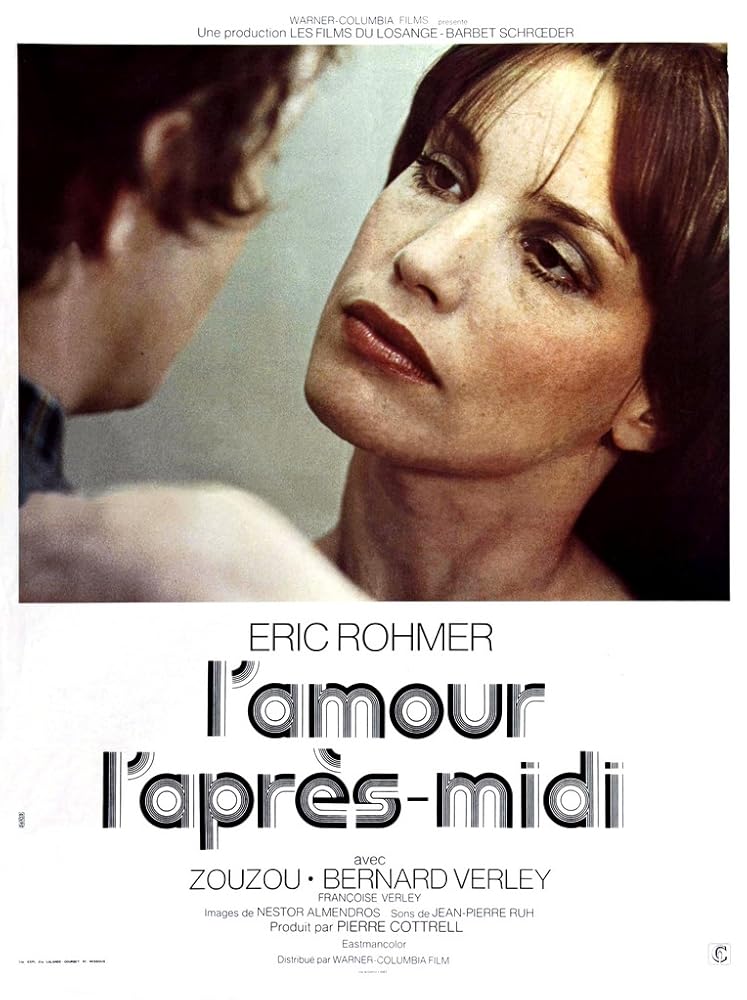
CHLOE IN THE AFTERNOON (L’Amour, L’Apres-Midi)(LOVE IN THE AFTERNOON)
(director/writer: Eric Rohmer; cinematographer: Nestor Almendros; editor: Cecile Decugis; music: Arié Dzierlatka; cast: Bernard Verley (Frederic), Zouzou (Chloe), Françoise Verley (Helene), Daniel Ceccaldi (Gerard), Malvina Penne (Fabienne), Babette Ferrier (Martine), Frédérique Hender (Mme. M.), Claude-Jean Philippe (Mr. M.), Beatrice Romand (Dream Sequence), Marie-Christine Barrault (Dream Sequence); Runtime: 97; MPAA Rating: R; producer: Pierre Cottrell; Fox Lorber; 1972-France-in French with English subtitles)
“Though the film is talky and boring, its moral ethic lesson is compelling even if the hero isn’t.“
Reviewed by Dennis Schwartz
The last of Eric Rohmer’s (“My Night at Maud’s”/”Claire’s Knee“/”Pauline at the Beach“)Six Moral Tales is also about a conflict between what a man wants and what he gets (usually a woman he loves and one he lusts after). This time the protagonist, Frederic (Bernard Verley), is a dull married bourgeois Paris executive, who is partners in a thriving small business with the easy-going Gerard (Daniel Ceccaldi). Frederic is happily married to English teacher Helene (Françoise Verley, a real-life married couple) for three years and the suburban couple have a cute daughter, and are expecting another child.
The long prologue sets up Frederic as someone with a roving eye for women, a daydreamer (of previous Rohmer heroines), someone who imagines making love with strange women he encounters in the street during his afternoon stroll, and who conservatively flirts with his attractive secretary (Malvina Penne) without really flirting. All the time Frederic is faithful, and enjoys the freedom of spending unorthodox lunch hours by going on shopping sprees.
Into his stable cushy life enters the unstable Chloe (Zouzou), a girlfriend of his old friend Bruno. Chloe is a free spirit who has been away from France the last six years, living in America and Spain. She starts coming regularly to his office for long chats and sees him during his lunch break, and involves him with her constant change of jobs (barmaid, waitress and boutique store clerk) and apartments. He feels comfortable talking to her in an intimate way he doesn’t with his wife and is tempted to have an affair with her, but when she finally offers herself to him he can’t cheat on his wife. In fact, this slight stumble brings him closer to his chilly wife.
Rohmer is trying to make a distinction between love and sex, while addressing his theme of marital infidelity. He actually salutes his unappealing hero for being so bourgeois, self-absorbed and faithful. Though the film is talky and boring, its moral ethic lesson is compelling even if the hero isn’t.
REVIEWED ON 6/6/2010 GRADE: B-